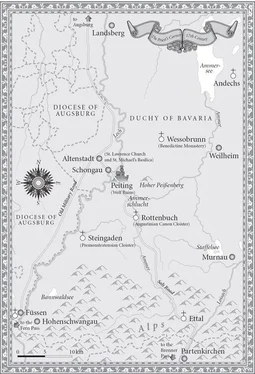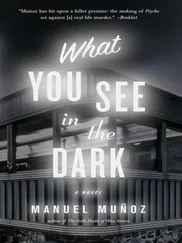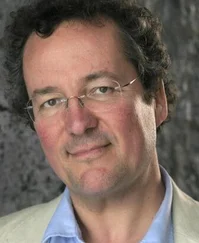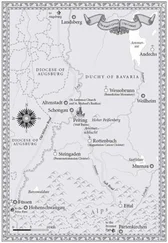Oliver Potzsch - The Dark Monk
Здесь есть возможность читать онлайн «Oliver Potzsch - The Dark Monk» весь текст электронной книги совершенно бесплатно (целиком полную версию без сокращений). В некоторых случаях можно слушать аудио, скачать через торрент в формате fb2 и присутствует краткое содержание. Жанр: Исторический детектив, на английском языке. Описание произведения, (предисловие) а так же отзывы посетителей доступны на портале библиотеки ЛибКат.
- Название:The Dark Monk
- Автор:
- Жанр:
- Год:неизвестен
- ISBN:нет данных
- Рейтинг книги:5 / 5. Голосов: 1
-
Избранное:Добавить в избранное
- Отзывы:
-
Ваша оценка:
- 100
- 1
- 2
- 3
- 4
- 5
The Dark Monk: краткое содержание, описание и аннотация
Предлагаем к чтению аннотацию, описание, краткое содержание или предисловие (зависит от того, что написал сам автор книги «The Dark Monk»). Если вы не нашли необходимую информацию о книге — напишите в комментариях, мы постараемся отыскать её.
The Dark Monk — читать онлайн бесплатно полную книгу (весь текст) целиком
Ниже представлен текст книги, разбитый по страницам. Система сохранения места последней прочитанной страницы, позволяет с удобством читать онлайн бесплатно книгу «The Dark Monk», без необходимости каждый раз заново искать на чём Вы остановились. Поставьте закладку, и сможете в любой момент перейти на страницу, на которой закончили чтение.
Интервал:
Закладка:
The monk with the curved dagger nodded grimly; then the three set out like tracking dogs after a fresh scent.
7
Jakob Kuisl walked along the steep slope of the Ammer Gorge, looking down at the rushing river over two hundred feet below. Ice floes drifted along the surface, bumping into one another, piling up in bizarre formations that reminded the hangman of a crooked, worn-out flight of stairs. Below, darkness was already approaching, and before long the temperature would drop. Slowly, the sun dipped below the tree line, bathing the faces of the search party in the last rays of golden sunlight.
“We need to stop for today,” Hans Berchtholdt mumbled behind him. “It’s like hunting for a needle in a haystack.”
Almost from the very start of the hunt, the baker’s son had expressed doubts about the undertaking, and then the other patrician sons had followed suit. How would they ever find a band of robbers in the vast Schongau forest? Wasn’t this a job for soldiers and simple constables, anyway? Even if some of the young men had been keen on the idea at first-they hoped to finally have a chance to play real war games-the cold, strenuous march had robbed them of their last bit of enthusiasm. Now all they wanted was to go home.
Jakob Kuisl kept a careful eye on the other bank of the river, hoping to spot any sign of suspicious movement. Highway banditry had always plagued the Bavarian forests, but since the Great War, it had become practically impossible to travel from city to city without an armed escort. Several times a year, Kuisl strung up a few thugs on Gallows Hill, some no older than fourteen, but it did no good. Hunger and desire trumped fear of the hangman. And this winter, the gangs of robbers were larger than they had been in many years. Their leader, Hans Scheller, had rallied almost two dozen of his cronies, among them former mercenaries, but also farmers whose fields, barns, and livestock had been destroyed in the war, as well as their women and children.
“Hey, Kuisl, I’m talking to you! Let’s go home. You can keep looking by yourself.”
Kuisl gave the baker’s son a scornful look. “We’ll check out one last hiding place; then you can go home to your warm feather bed. You do look completely frozen, or does the red nose come from the boozing?”
Hans Berchtholdt turned even redder. “Don’t get smart with me, butcher!” he shouted, putting his hand on his sword. “I won’t let someone like you lecture me. It’s a disgrace that Lechner put you in charge!”
“Watch your tongue, Berchtholdt!” said Jakob Schreevogl, who up to that point had been walking ahead silently with the hangman. “You heard yourself what the clerk said. Kuisl knows what he is doing better than any of us, and so he’s the leader.”
“Berchtholdt is right, Schreevogl!” This time it was Sebastian Semer, son of the presiding burgomaster. In a tight-fitting doublet with copper buttons and an elegant round hat adorned with a rooster feather, he looked quite out of place here in the forest. In addition, the cold seemed to be getting the best of the young patrician in his thin leather boots. His voice trembled-whether from the cold or out of some unconscious anxiety about confronting the hangman, Jakob Kuisl couldn’t tell. “It’s unheard of that a butcher and executioner is ordering around honorable citizens,” Semer finally said. “I…I…shall complain to my father!”
“Yes, yes, do that, and get started before nightfall.”
Kuisl stomped ahead, hoping that the group would follow. He could feel his authority slipping away. He could count on the fingers of one hand the men who trusted him in this endeavor: Jakob Schreevogl; old Andre Wiedemann, whom he had known since the war; perhaps the blacksmith, Georg Kronauer; and a few workers. The rest followed him because the clerk ordered them to and because they feared the hangman.
Kuisl sighed under his breath. Most people didn’t consider executioners honorable citizens because the job involved things that no one else wanted to do: torturing and hanging criminals, removing dead animals from town, sweeping up the streets, and preparing magic drinks and extracts. For the sons of the aldermen, the very idea that such a person should give them orders was an abomination. Kuisl could sense clearly that resistance was brewing.
Under his breath, he cursed Lechner for having put him in this situation. Was it possible that Lechner just wanted to get rid of him? For far lesser reasons people had lynched hangmen. If the next hideout was empty like the rest, the hunt for robbers was over for him, too.
When he stepped out from behind the next dense grove of pines, however, he knew at once that they were on the right track this time.
From down below in the gorge, smoke rose toward them-just a thin column, but easy to see in the cold winter air. Kuisl grinned. He had been sure the scoundrels were hiding out somewhere around here. When he planned the hunt, he knew there was little point in just stumbling through the forest hoping to happen on individual bandits. The region around Schongau was a wilderness of forests, gorges, and steep hills. Around each town, only small areas were farmed, and beyond them the primeval forest took over, endless and profound.
The hangman knew this area better than anyone else. In recent years, he had combed miles of the forest for healing and poisonous plants. He knew every major cave, every ruin, every hiding place. They had already been to three possible hideouts that day, and now, at the fourth, their luck seemed to have changed. From the beginning, Kuisl suspected he would find something here at Schleyer Falls.
The smoke rose through a crevice in the rock near the steep slope. The hangman knew that, below, huge limestone formations had been hollowed out by water over a period of thousands of years, concealing an extensive network of caves with entrances behind the waterfalls. Here, at Schleyer Falls, the water flowed over green moss, down to the Ammer River in the summer; now, in the winter, icicles hung down like a white curtain in front of the entrances.
Kuisl bent down to inhale the smoke, which smelled like roasted meat and burned fat. It was coming up through a natural chimney in the rock and had to be from a large campfire.
“Hangman, what’s wrong? Why-”
Kuisl motioned to the baker’s son to be silent, then pointed to the column of smoke and a small path about a hundred and fifty feet in front of them that led down into the gorge. He was about to move ahead when he caught sight of a few iron rungs that lead downward in the rock wall next to him.
“Their escape route,” he whispered. “We have to split up. You take the main body of men down the path,” he said, addressing Jakob Schreevogl. “I’ll climb down the rungs with a smaller number of people, just to make sure they don’t slip away from us like rats through this escape hatch.”
He reached into a sack he had been carrying over his shoulder, took out some torches, and distributed them to Andre Wiedemann and Georg Kronauer. “We’ll smoke them out from behind,” he said to the others. “You’ll be waiting by the entrance, and when they come out, capture as many as you can, but if anyone resists, kill him.”
The old war veteran Andre Wiedemann grumbled his approval, while Hans Berchtholdt’s face turned as white as a sheet. “Shouldn’t a few of us wait up here just in case someone slips by you?” he stammered. Like his friend, Sebastian Semer was suddenly no longer as outspoken as he had been moments before. An owl hooted somewhere, and he glanced anxiously in all directions.
“Nonsense,” Kuisl said as he stuffed his two freshly oiled wheel lock pistols with powder, still chewing on his cold pipe. “We need every man down below. Now, off you go!”
Читать дальшеИнтервал:
Закладка:
Похожие книги на «The Dark Monk»
Представляем Вашему вниманию похожие книги на «The Dark Monk» списком для выбора. Мы отобрали схожую по названию и смыслу литературу в надежде предоставить читателям больше вариантов отыскать новые, интересные, ещё непрочитанные произведения.
Обсуждение, отзывы о книге «The Dark Monk» и просто собственные мнения читателей. Оставьте ваши комментарии, напишите, что Вы думаете о произведении, его смысле или главных героях. Укажите что конкретно понравилось, а что нет, и почему Вы так считаете.












